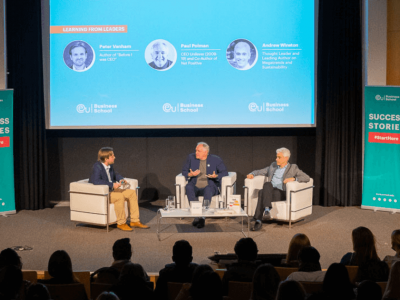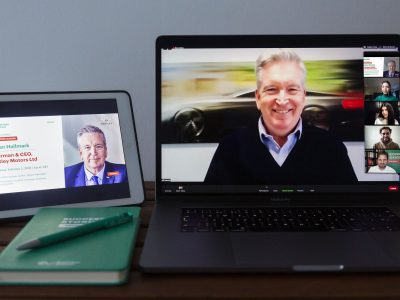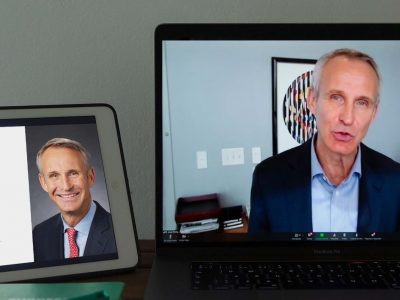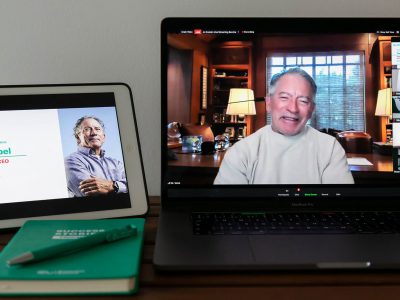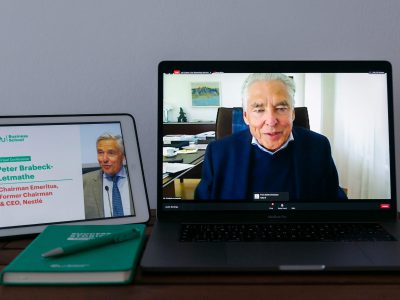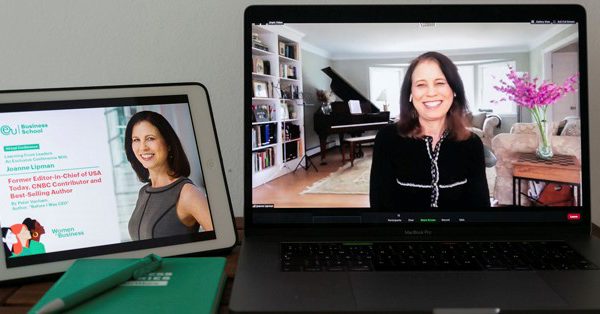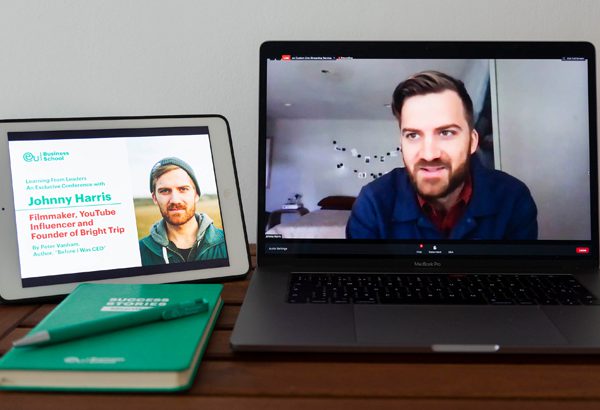Insights From Global Business Leader Ronnie Leten, Chairman of Ericsson
The latest in EU’s ongoing signature event series Learning From Leaders featured a fascinating and insightful deep dive with Chairman of Ericsson, Ronnie Leten. The series, in which author of ‘Before I Was CEO’ Peter Vanham interviews global business leaders, will continue virtually while we’re not able to gather in person.
Luc Craen, Managing Director and Vice President of EU Business School, opened the session from Geneva, introducing Ronnie as one of the first people to have anticipated the scale of disruption coronavirus would cause. What followed was an incredibly insightful conversation exploring Ronnie’s foresight and predictions for the economic impact of the virus, as well as reflections and wisdom drawn from his impressive career. The discussion between Ronnie, in Belgium, and Peter, in Switzerland, was punctuated by thoughtful questions from EU Business School students.
Here, we’ve summarized pertinent insights and business wisdom shared at this fascinating virtual event.
Remaining Productive During the Pandemic
Ericsson was one of the first companies to pull out of this year’s annual Mobile World Congress. Scheduled for February 2020, the conference was eventually cancelled due to the growing pandemic. Peter Vanham asked Ronnie how he’d anticipated the upcoming crisis and how Ericsson had managed to keep working despite global disruption.
One of the privileges of leading a global company is having sensors all around the world. Ronnie reported how Ericsson’s teams in Asia were extremely concerned about the virus and how difficult it was proving to manage. Their worries led to Ericsson pulling out of the event ahead of many others, a brave decision that proved to have been the right one.
As an information and communication technology company, Ericsson was perhaps better prepared than many to weather the storm to come. Having the infrastructure already in place made the transition to remote work much easier and they now have 85,000 staff working remotely around the world.
Prior to the pandemic, Ericsson had been in the process of rolling out 5G in countries around the world. Ronnie confirmed that the installation has mostly been able to continue as planned, although there have been some delays in areas with stricter lockdown protocols in place. “Networks are as essential as water or electricity so we make sure that our people can continue to work safely to get the job done”, Ronnie remarked.
Global Business Success
Long before Ronnie joined Ericsson as chairman, the company underwent a particularly tricky transition, one that pulled many telecommunications companies under. This was their move from manufacturing mobile phones to providing networks and infrastructure to countries around the world, and the transition from analog to digital systems, a dramatic overhaul that required a huge shift in internal competence.
Emerging ever stronger from the change, innovation became fundamental to the spirit of Ericsson. Central to their approach is an “army of R&D” as Ronnie put it, pushing the company to constantly reach beyond the known edge of technological capability.
They’re also known for taking a customer-centric approach, a strategy observed by Nirmaan, a student of business finance at EU’s Geneva campus who joined the event from India. “Listening to the challenges and opportunities that customers identify”, Ronnie agreed, “is fundamental”. Price increases should always be matched by an increase in value for the customer. Successful businesses need also to be aware that customers in India and Africa, for example, might experience completely different challenges or have the same needs but at different times. What you offer needs to adapt to these different markets in order to maximize growth and profitability.
With over $20 billion in revenue each year, nearly 100,000 employees and networks in around 185 countries, Ericsson’s success is apparent; the company is everywhere. But perhaps it’s not surprising. As Ronnie remarked: “mobile communication is an essential part of our lives”.
5G and the Future
There are really just five key players in the 5G market who’re able to build and manage 5G networks and maintain the requisite level of security. Ericsson is arguably the leader of the pack, and its key competitors include Nokia and Huawei. Ronnie noted that, while it will take a while for everyone to catch up, rolling out 5G compliancy is the next big challenge for all telecommunications providers.
Throughout history, technology has driven changes to the economic landscape. So, Peter asked, what transformation can we expect to see following the rollout of 5G?
“It goes beyond our imagination”, Ronnie admitted; it’s nearly impossible for anyone to imagine the full scale or breadth of change that 5G will enable. On an individual level, consumers will notice much faster speeds when using their mobile devices. But the transformative effects will really be seen in industry, where Ronnie expects there to be a considerable boost in productivity.
As well as much discussed technologies like autonomous driverless vehicles, there are more niche advantages to come. In gaming, players competing across the globe will have a more seamless experience as lag is eliminated. Factories will be significantly impacted – the speed and wireless connectivity of 5G will enable factory robots to perform multiple functions simultaneously, for example manufacturing a product while carrying out quality control and projecting the quarter’s revenue. Most beneficial perhaps for wider society will be the ability to safely conduct remote surgery, meaning experts in the medical profession will be able to treat many more patients and support doctors around the world.
In fact, when asked about the rumored negative health effects of 5G by EU student Nigel, Ronnie said he believes that 5G will actually save lives, particularly in countries with less developed medical infrastructure where the ability to ‘stream in’ doctors remotely will be transformative.
And, although he’s not a scientist, he reassured guests that the frequency and waves used for 5G are the same as those used for 4G and 3G before it. Of the many informative reports he’s read, none have suggested 5G will have any negative health impacts whatsoever.
Becoming an International Business Leader
Ronnie Leten has had a remarkable and varied career spanning finance, operations and technology. At 63 years old, he’s still restless when he’s not learning, pushing boundaries or trying new things.
His thirst for challenge has driven him to reach the top. The role of chair of the board for Ericsson is a post “you don’t apply for, you get contacted”, he revealed. So, how did he get there and what tips does he have for EU students?
First, you need to recognize your strengths and weaknesses. For Ronnie, this meant “I couldn’t have been a teacher, I am too impatient, but I love to work with others and to create things.”
Being focused and energetic was fundamental to progressing early in his career where he was often working 24/7, seven days a week. After studying for his bachelor’s in business administration, like many of EU’s students, he was hired as the assistant to the COO and CEO at General Biscuit. There he was exposed to challenging projects, interacted with all areas of the business and travelled throughout Europe. This opportunity was not just down to luck, it was something that he sought out. Ronnie made sure he always pushed beyond what was expected and came back from each trip or project with something – an observation or idea – to share with his seniors. Meanwhile, he was studying at nights and weekends on an IBM IT course. Ronnie highlighted how hard he worked when starting out and the many hours he put in to get where he is today; “you have to want it and be willing to make sacrifices.”
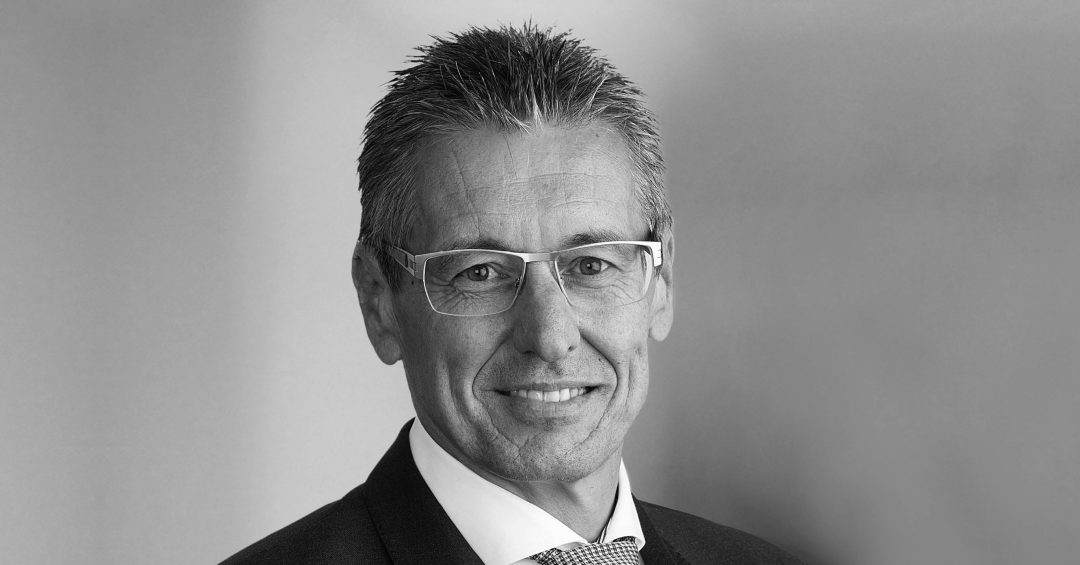
Ronnie’s next role saw him managing the transition to IBM for global industrial company Atlas Copco; the IT course he’d taken had paid off. He completed the project in three years, making change at every level of the business including replacing hardware, refreshing processes, distribution and sales technology, a challenge he greatly enjoyed.
However, following a disagreement with some of the leadership Ronnie left the company he still very much loved to explore his horizons elsewhere. He spent the following couple of years at an automotive company as an operational plant manager, overhauling a factory that was struggling. Characteristic of Ronnie’s broad career, the role was quite a departure from what he’d done before. This was what he referred to as “the best MBA program ever”; new experiences kept pushing him to learn and grow throughout his time there. But the pull back to Atlas Copco was strong and he returned to the company after just a couple of years away, rising steadily through the ranks and eventually becoming CEO.
Knowing when and how to leave a role is tricky, particularly when you still love the company you work for. EU student Dora asked Ronnie how to know when to make that leap.
To advance in your career, he noted, it’s important to have access to learning opportunities and exposure to new experiences that’ll challenge you professionally. Being pushed and appreciated is key to thriving at work. Perhaps most important, however, is to be happy, enjoy what you do and have fun. This will help you to have the energy you’ll need to get ahead. If you’re not enjoying your work, it’s time to leave. But leave well – you never know if you’ll end up going back!
After accepting the role of chairman at Ericsson, Ronnie was able to return to his native Belgium. He still doesn’t know exactly why he was chosen for the position, but having built a good network and excellent reputation in Sweden during his 22-year career at Atlas Copco, during eight of which he was CEO, he was perhaps an obvious choice for the role.
Reputation is key, Ronnie advised EU students, “You only have one reputation, manage it well. Decide how you want to be perceived and be consistent”.
And it’s advice worth heeding. Shares in Ericsson rose by 2.2% after Ronnie’s appointment as chairman was announced, demonstrating the value of the excellent reputation that preceded him.
Finding success as chairman offered another stimulating challenge. The position is distinct from an executive role and requires excellent listening skills, the ability to build and nurture strong relationships with the management team and to collaborate to identify areas of focus. Above all, Ronnie said, it is important to be humble. Although he brought an incredible wealth of experience to the role, telecommunications is a different business and there was a lot to learn. Which presumably, given his self-confessed love of a challenge, was one of the draws of the position.
Finding Employment After a Crisis
Asked for his advice for soon-to-be-graduates looking to enter the job market, Ronnie encouraged students to stay calm, to be cautious and observant; this is not the time for risk-taking but it’s also not a time to panic. The world will go on and in two or three months’ time, we will have a much better idea of what the future will look like.
For those considering starting their own company, Ronnie urged them to forge ahead, but to do so in the leanest possible way. He shared an anecdote about starting a company with just one euro while he was still a student, negotiating long payment terms with suppliers and short payment terms with customers. “Many startups operating today burn through a lot of cash but it is possible to start up in a different, leaner way”. Finally, he invited students to focus on finding solutions rather than looking at problems, an attitude that will help them become indispensable to potential employers.
What’s Next for the Economy?
During the economic recovery from COVID-19 Ronnie doesn’t expect to see any immediate, dramatic changes. However, he does predict a gradual shift in global supply chains towards a regional model to enable better management of interruptions like those caused by coronavirus.
Across the board the way we work will be reconsidered. Having gained a greater collective understanding of what’s possible digitally, he hopes there will be less business air travel given that virtual connectivity makes this inessential. And, although a complete transition to remote working won’t be possible – many types of work require active interaction and emotion and cannot be done remotely – he does anticipate a blend of the two, with many more jobs that involve the exchange of information happening remotely.
Looking Forward With Positivity
To close this enlightening event, Luc Craen, Managing Director and Vice President of EU Business School, thanked Ronnie for sharing his priceless knowledge and advice. Above all, he thanked Ronnie for his optimism in difficult times and urged EU students to follow suit. Luc instigated a virtual round of applause for Ronnie that brought a warming sense of togetherness often absent in digital gatherings. The interactive format of the event, with students participating in the conversation from around the world, was a fantastic representation of the indomitable EU community spirit that, despite current challenges, remains collaborative, hopeful and future-focused.
The Learning From Leaders series will continue virtually with two upcoming events. On Thursday, April 30, we welcome former CEO and chair of Tupperware Brands, Rick Goings. In a few weeks’ time Jean Claude Biver, LVMH Group, Non-Executive Chairman of the Watch Division, Chairman of Hublot and Zenith Watches, will join Peter Vanham on the virtual stage.
If you’re interested in joining our community and accessing exclusive events from our Learning From Leaders series, explore our programs. All students will be attending their summer semester online but, for those who wish to study on-campus, we’re offering a blended approach to learning that’ll enable them to make the best of both worlds.



